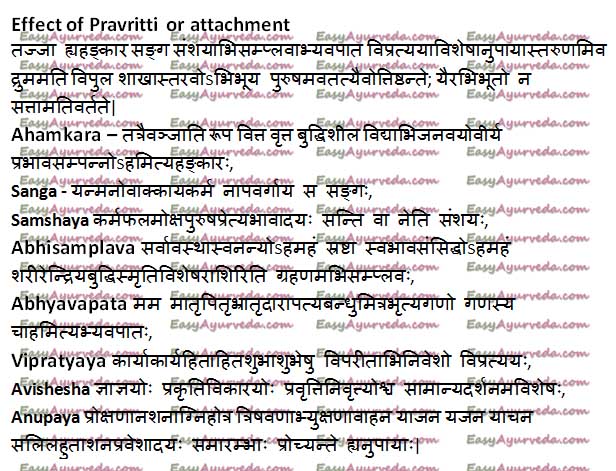Pravritti – Attachment, Meaning, Causes, Effects of Attachment
Article by Dr Raghuram Y.S. MD (Ay) & Dr Manasa, B.A.M.S
Pravritti means attachment.
Attachment to worldly desires and pleasures is the root for all the miseries.
Table of Contents
Causes of Pravritti
Attachment is produced by moha (ignorance), ichcha (desire) and dwesha (hatred).
Effect of Pravritti
Effect of Pravrutti or attachment
Attachment gives rise to the below mentioned entities –
- Ahamkara
- Sanga
- Samshaya
- Abhisamplava
- Abhyavapata
- Vipratyaya
- Avishesha
- Anupaya

Ahamkara
Ahamkara means egoism or egoistic feeling.
When under the influence of egoism caused by attachment, one would feel that he has been endowed with best caste, beauty, wealth, job, intelligence, character, education, place, age, strength, influence etc.
Sanga
Sanga means obstruction in the pathway of attaining salvation.
Deeds of the mind, speech and body which are not conducive for the attainment of moksha or liberation are called Sanga.
Sanga means obstruction. These misdeeds done by the means of mind, speech and or body will prove to be obstacles for attainment of salvation. One tends to do these misdeeds when he or she is attached to the worldly pleasures and things (pravritti).
Samshaya
Samshaya means doubting.
Doubting about the existence of karma phala (effects of past deeds), moksha (salvation), purusha (soul), pretyabhava (life after death) etc is called Samshaya.
Abhisamplava
Self-importance of extraordinary nature (beyond limits) is called abhisamplava. It is also a form of ahankara or egoism.
Abhisamplava includes feelings such as –
- Sarva avasthasu Ananyo aham – I am the first and most important in any situation
- Aham Srashta – I am the creator
- Swabhava samsiddho aham – I am naturally blessed by the nature
- Aham shareera indriya buddhi smriti vishesha raashih iti – I have been bestowed by (I am a wonderful compilation of) excellent physique (physical health), sense organs and mind (healthy mind and sense organs), intelligence, memory etc.
Abhyavapata
Abhyavapata means attachment and possessiveness with family and friends.
Attachment towards father, mother, wife, children, relatives, friends and servants is called Abhyavapata. In Abhyavapata, the extreme possessiveness towards the mentioned categories of near and dear ones gives a feeling that ‘they belong to me and I belong to them’.
Vipratyaya
Vipratyaya means opposite actions.
One who doesn’t know to distinguish and discriminate between what works (deeds) should be done and what should not be done (karya-akarya), is ignorant between good and bad (hita-ahita) and between conducive and non conducive (shubha-ashubha) and acts opposite to that are called Vipratyaya.
Avishesha
Avishesha means inability to differentiate between things.
One’s inability to differentiate between conscious and unconscious elements (jgna and ajgna), nature and its modifications / deviations (prakriti-vikara), attachment and detachment (pravritti-nivritti) is called avishesha.
Anupaya
Anupaya means performing weird activities or some activities repeatedly though they do not yield anything.
Anupaya comprises of the below mentioned activities –
- Sprinkling of water along with chanting hymns (prokshana)
- Fasting (anashana)
- Performing sacrifice in the morning and evening (agnihotra)
- Invoking by sprinkling holy water (aavahana)
- Performing sacrifices (yaajana)
- Performing rituals (yajana)
- Begging (yachana)
- Entering into the water (salila pravesha)
- Entering into the fire (hutaashana pravesha) etc
Just Before Finishing –
All the above said Ahamkara, Sanga etc are the effects of attachment or pravritti. Pravritti is the root source or cause of many miseries. Therefore one should not be attached to the worldly pleasures and things in fact should keep ourselves away and detached from these fatal attractions which lead us into the ocean of grief and miseries. In this article, I have covered in detail the meaning of Pravritti and the consequences which occur when one gets indulged in Pravritti. Nivritti or detachment from these things is responsible for happiness and the pathway to attain moksha or salvation.
Click to Consult Dr Raghuram Y.S. MD (Ayu) – Email / Skype








